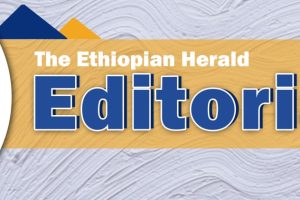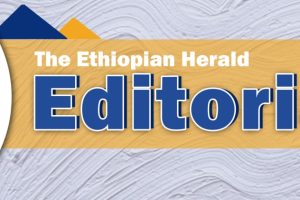
Changes and reforms never take place on the red carpet. The battle of ideas between political nihilists who wish to twist the trends in the democratic reforms in the country and those who push for more deep seated reforms has continued unabated.
While the politicians in the country have so far failed to bring about a sustained solution to the crisis in the country, elders, Aba Geda and senior members of the Ethiopian social fabric are doing their best to persuade armed groups to opt for peace and stability. Some universities and schools in most of the conflict ridden are now open and stability is coming afore in a creeping manner.
The main roads in the country are open and a substantial number of IDPs are being transported to their original domiciles. Those who oppose the reform program are busy creating one form of sabotage against the other in their efforts to inflict total crisis in the country. They use all kinds of seemingly democratic sugar coated arsenals ranging from issues of identity, local border demarcations, bureaucratic red tape and delaying tactics in project implementations.
In short, they are using errors and minor contradictions in the political system to escalate irreversible ramifications of multiple crises. The recent meeting of the Executive Committee of the EPRDF has rightly concluded that there is a need for political rectification within and without the ruling party. However, it is one thing to correctly evaluate the situation in the country and launching an urgent task to effectively correct these problems. Is the ruling party effectively ready to play a leading role in correcting the mistakes that are at least identified in a bird eye view? Are the executive and middle level party leaders ready to find solutions to the outstanding problems?
This needs to be verified and insured. The intra and inter party unity in the EPRDF is highly critical for consolidating the political system in this country. Given the role that Ethiopia is playing at the global and regional levels, ascertaining total peace and stability in Ethiopia is very important for both national and regional security and stability.
Urgent mobilization of the elements of the political system to ascertain safety and security of the citizens is a constitutional obligation of the government and the ruling party. If this is not swiftly accomplished the peoples of Ethiopia will lose confidence in the government which they have elected to political power.
The economic condition of the country is in a critical condition. The skyrocketing of local food prices, lower prices for export coffee at the global market, the galloping rate of unemployment, financial conspiracy by anti-reform elements in money laundering, lower level of tax revenues, contraband in arms and other commodities are all known and admitted by the executive committee of the EPRDF.
In terms of the service delivery, power outrage in critical industries like railway transport and other mid level industries, lack of basic service delivery in conflict ridden areas are all affecting the daily life of citizens.
All the above concerns both in the political, economic and social service areas are urgent and are related with the daily life of citizens. Of all the issues that stand face to face with the peoples of Ethiopia, resolving major domestic political issues is highly critical. The EPRDF should be credited for launching a national reform program that is gradually gaining momentum but one can hardly believe that the entire members of the organization are fully supporting the reform program right from the top to the lower level of the political structure.
The army, the police and the security forces are is grappling with rogue elements that are out to discredit the sovereignty of the peoples and government of Ethiopia. These forces are paying sacrifices to ascertain the rule of law in the country but what are the cadres of both ruling and opposition political parties doing on their part?
At this political juncture in which the nation is calling for unity, stability and development, if the members of these parties are not practically part of the solution to the impending catastrophe, they will certainly become problems and obstacles to the national reform. Polemics, discussions over the media on various issues related to the challenges the country is facing are necessary and encouraging at face value but these discussions cannot be an end in themselves unless they are action oriented. It is better to profess less and act more. The university students in this country have come a long way before they have reached to this stage.
A university is built by the fund from tax paid by the ordinary citizen and the students are enrolled simply to get the necessary education that they need to develop their own career and also contribute their part to the development of this country. A university is an academic center and not a place for political rhetoric or a forum for fanning issues of identity or other forms of political squabbling.
The major task of a university student is to LEARN and conduct RESEARCHES on the subjects of his own discipline. One of the most appalling issues in Ethiopia is the general misconception on democracy and good governance. Democracy entails full responsibility and accountability for ones action while enjoying full legal and constitutional rights. It has nothing to do with anarchism or Trotskyite politicking. We need to work towards the eradication of poverty which is the root cause of our backwardness in every aspect of our socio-economic profile.
We are now grappling with basic health problems like HIV and AIDS, kidney diseases, upper respiratory infections and a whole list of health hazards that need to be addressed. Quite a considerable number of our youth are addicted to multiple kinds of drugs and gender related violence is still going on. Given the level of our socio-economic and political problems, the political parties and self styled “activists” need to be active in solving the problems that the ordinary citizens in Ethiopia is facing. Now what are the basic solutions to this state of limbo in which the political system is engulfed?
First and foremost, the ruling front should settle its own account among its membership of the coalition and the entire membership. Second, all political parties whether they are opposition or from the ruling political front should officially declare their own national ruling on peace and instruct their members to respect the cause of peace with no strings attached.
Third, urgent tasks need to be set in motion to collect tax that is needed to run the projects some of which are delayed or stalled. Fourth, the public, both at the federal and regional level should take part in practical peace keeping in coordination with the army, police and the security forces to save the gains of the reforms and other development gains the country has so far attained.
This is a high time that all citizens need to practically rally behind the government to save the reform from being usurped. The current Ethiopian media resembles like a ship with no compass and is not at the level expected from it to keep up to the expectations of the reforms. The sector needs its own reforms, not in the future but urgently. The leadership of the Ethiopian media should set an example at this stage when the motherland is facing unprecedented challenges. The current reform is critical for the very survival of the country and the government. All citizens need to do their part not from orders but from the love they profess to have for their own country.
Herald January 22/2019
BY SOLOMON DIBABA




